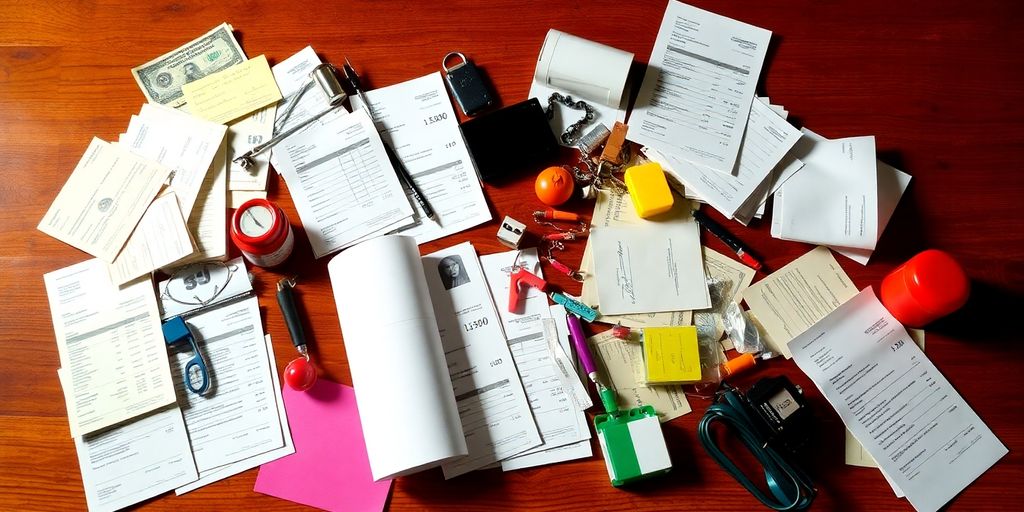The Most Popular Expense Categories: Where Does Your Money Go?

Understanding Popular Expense Categories
The Importance of Budgeting
Budgeting isn't just about pinching pennies; it's about knowing where your money goes and making sure it aligns with your priorities. Think of a budget as a map for your finances. It helps you decide what's essential and what can wait. When you categorize your expenses, you gain insights into your spending habits, which can be a real eye-opener. You might discover that those daily coffee runs add up to a hefty sum over a month.
How Expense Categories Impact Financial Health
Organizing expenses into categories can have a significant impact on your financial well-being. By breaking down your spending into categories like housing, food, and entertainment, you can see exactly where your money is going. This approach helps in identifying areas where you might be overspending and where you can cut back. For instance, if you notice that dining out takes a big chunk of your budget, you can plan to cook more at home.
Common Misconceptions About Expense Categories
One common misconception is that categorizing expenses is only for those who struggle financially. In reality, everyone can benefit from understanding their spending habits. Another myth is that it's too time-consuming. But once you set up your categories, it becomes second nature. Some people think they need to track every penny, which isn't true. Focus on the big categories that make the most impact on your budget.
Knowing your expense categories is like having a financial compass. It guides you to make informed decisions and helps you stay on course with your financial goals.
For businesses, understanding expense categories is equally crucial. Grouping similar costs, like marketing and operations, can streamline financial tracking and reporting, making it easier to manage and optimize expenses.
Housing: The Largest Expense Category

Housing typically takes up the largest chunk of a person's budget, eating up about 25-35% of income. This category includes rent or mortgage payments, property taxes, and utilities. It's a significant portion of your expenses, so understanding how to manage it effectively is key.
Rent vs. Mortgage: Weighing the Costs
Deciding between renting and buying a home is a big financial decision. Renters usually have fewer upfront costs and more flexibility to move, while homeowners can build equity over time. However, homeownership also comes with hidden costs like maintenance and property taxes. When choosing, consider your financial situation, lifestyle, and long-term goals.
Hidden Costs in Housing
Owning a home isn't just about paying the mortgage. Unexpected expenses can pop up, such as repairs, maintenance, and homeowners association fees. Renters might face rent increases or incur costs for breaking a lease early. Keeping an emergency fund can help manage these unforeseen expenses.
Tips for Reducing Housing Expenses
- Downsize: Consider moving to a smaller place to save on rent or mortgage.
- Negotiate Rent: Talk to your landlord about lowering your rent, especially if you're a long-term tenant.
- Energy Efficiency: Invest in energy-efficient appliances to lower utility bills.
Reducing housing costs can free up money for other essential expenses and savings. It's about finding a balance that fits your lifestyle and financial goals.
Managing your housing expenses effectively is crucial for maintaining a healthy budget. By understanding the costs involved and exploring ways to reduce them, you can ensure that this largest expense category doesn't overwhelm your finances.
Transportation: Navigating Your Travel Costs
Public Transit vs. Personal Vehicle
When it comes to getting around, the choice between public transportation and owning a car can make a big difference in your budget. Public transit can be a cost-effective option if you live in a city with a reliable system. It saves you from the hassles of parking, maintenance, and fluctuating gas prices. On the other hand, owning a car offers convenience and flexibility, especially in areas where public transit is limited. Weighing these options often comes down to personal preference and lifestyle.
Here's a quick comparison:
| Expense Category | Public Transit | Personal Vehicle |
|---|---|---|
| Monthly Cost | $50 - $150 | $356 - $535 |
| Maintenance | Low | High |
| Flexibility | Limited | High |
The Rise of Ridesharing
Ridesharing services have changed how we think about getting around. With the tap of a button, you can get a ride to almost anywhere. These services, like Uber and Lyft, offer a middle ground between public transit and owning a car. They're convenient for occasional use and can be cheaper than owning a car if you don't drive often. However, frequent rides can add up quickly, so it's crucial to track your spending.
Maintaining Your Vehicle on a Budget
Keeping a car running smoothly without breaking the bank is a challenge many face. Regular maintenance is key, and it doesn't have to be expensive. Here are some tips:
- Stick to the basics: Regular oil changes and tire rotations can prevent costly repairs down the line.
- Use gas-finder apps to always find the cheapest fuel options.
- Perform simple tasks like replacing air filters and windshield wipers yourself to save on labor costs.
Regularly checking your vehicle and keeping up with maintenance can extend its life and save you money in the long run. Don't ignore small issues, as they can lead to bigger, more expensive problems.
For more travel money-saving tips, consider packing light and shopping at local grocery stores to cut costs on the road.
Food and Dining: Balancing Necessity and Indulgence
Food is one of those things we can't live without, but it can also be a major budget buster if we're not careful. Balancing necessity with indulgence is key to keeping your food expenses in check. Here's how you can make the most of your food budget.
Grocery Shopping Tips
Grocery shopping is a big part of your food budget. Here are some tips to make sure you're not overspending:
- Plan Your Meals: Before you hit the store, plan out your meals for the week. This helps you buy only what you need and avoid impulse purchases.
- Make a List and Stick to It: Write down everything you need and try to avoid buying anything not on the list.
- Look for Sales and Coupons: Check out store flyers and apps for discounts and deals on items you regularly buy.
Dining Out: A Budget-Friendly Approach
Eating out doesn't have to break the bank. Here are some strategies to enjoy dining out without overspending:
- Limit Eating Out: Try to reduce the number of times you eat out each month. Save dining out for special occasions or treat yourself once a week.
- Choose Lunch Over Dinner: Lunch menus are often cheaper than dinner menus. Opt for lunch outings to save some cash.
- Share Meals or Order Appetizers: Portions at restaurants can be huge. Consider sharing a meal with a friend or order a couple of appetizers instead of a main dish.
Meal Planning for Savings
Meal planning is a great way to save money and ensure you're eating healthy. Here's how to get started:
- Batch Cooking: Prepare meals in bulk and freeze them. This saves time and money and ensures you always have something ready to eat.
- Use Leftovers Creatively: Don't let leftovers go to waste. Get creative and turn them into new meals.
- Incorporate Affordable Ingredients: Use ingredients like beans, lentils, and grains that are filling and budget-friendly.
Balancing your food budget is all about making smart choices. By planning ahead and being mindful of your spending, you can enjoy both your necessities and a little indulgence without stress.
Remember, when budgeting, it's essential to account for often overlooked monthly expenses such as food, utilities, housing, and more. Keeping track of these can help you maintain a balanced budget.
Healthcare and Insurance: Protecting Your Well-being
Understanding Health Insurance Options
Health insurance is like a safety net. It catches you when unexpected medical costs arise. From basic plans to comprehensive coverage, understanding your options is vital. Choosing the right health insurance plan can save you money and stress in the long run. Consider factors like premiums, deductibles, and network coverage when selecting a plan. Don't forget to check if your preferred doctors are in-network to avoid surprise bills.
Budgeting for Medical Expenses
Medical expenses can sneak up on you if you're not prepared. Here's a quick guide to budgeting for health costs:
- Estimate Routine Costs: Think about regular check-ups, prescriptions, and any ongoing treatments.
- Plan for the Unexpected: Set aside funds for emergencies like urgent care visits or unexpected surgeries.
- Include Insurance Premiums: If not covered by an employer, make sure your budget accounts for monthly insurance premiums.
Having a clear budget helps you manage your finances better, ensuring that medical expenses don't derail your plans. For more details on how to itemize medical and dental expenses for tax deductions, consult relevant guidelines.
The Role of Preventive Care
Preventive care is all about staying ahead of potential health issues. Regular screenings and vaccinations can prevent serious illnesses and reduce long-term healthcare costs. It's not just about avoiding sickness; it's about maintaining a quality life. Consider these preventive measures:
- Annual Physicals: Keep track of your overall health and catch any issues early.
- Vaccinations: Stay updated on necessary vaccines to protect against diseases.
- Healthy Lifestyle Choices: Eating well and exercising are simple ways to prevent many health problems.
Investing in preventive care today can lead to significant savings and a healthier future. It's about making small, consistent efforts that add up over time.
By understanding your health insurance options, budgeting effectively, and prioritizing preventive care, you can protect your well-being and financial health. Remember, health is wealth, and planning ahead is key to managing both.
Recreation and Entertainment: Enjoying Life Within Your Means
Affordable Entertainment Options
Finding affordable ways to have fun is key to balancing your budget. Here are some ideas:
- Local Events: Check out free concerts, festivals, or community theater shows in your area.
- Outdoor Activities: Parks, hiking trails, and beaches offer free or low-cost options for enjoying nature.
- Library Resources: Many libraries offer free access to books, movies, and even workshops or classes.
The Impact of Subscriptions on Your Budget
Subscriptions can be sneaky budget busters. It's easy to lose track of monthly charges for streaming services, magazines, or apps. Review all your subscriptions regularly to ensure you're only paying for what you actually use. Consider bundling services or opting for annual plans to save money.
Balancing Fun and Financial Responsibility
It's important to enjoy life without jeopardizing your financial health. Set a budget for entertainment and stick to it. Allocate a fixed percentage of your income for leisure activities and track your spending to avoid surprises. Remember, enjoying life doesn't have to mean breaking the bank.
Miscellaneous Expenses: The Catch-All Category

Identifying Miscellaneous Costs
Miscellaneous expenses are like the junk drawer of your budget. They hold a mix of costs that don't fit neatly into other categories. This could be anything from unexpected gifts to a new jacket you just had to have. These expenses often sneak up on you, making it crucial to track them. It's like when you find an old receipt in your pocket and wonder how it got there. Keeping these expenses in check is key to a balanced budget.
Managing Unexpected Expenses
Life throws curveballs, and sometimes your budget gets hit. An emergency car repair or a last-minute gift can throw things off. To handle these surprises, it's smart to have a plan. Consider setting aside a small fund just for these moments. A little cushion can save you from stress when the unexpected happens.
The Importance of an Emergency Fund
An emergency fund is your financial safety net. It's there for when life doesn't go according to plan. Whether it's a sudden medical bill or an appliance that decides to stop working, having this fund can prevent financial panic. Think of it as a backup plan for your budget. Building it might take time, but even a small amount can make a big difference.
"Having an emergency fund is like having an umbrella on a rainy day. You might not need it often, but when you do, you'll be glad it's there."
By understanding and managing miscellaneous expenses, you can maintain better control over your finances. This category may be a catch-all, but with a little attention, it doesn't have to catch you off guard.
Conclusion
In the end, understanding where your money goes is a big step toward taking control of your finances. By breaking down your expenses into categories, you can see the bigger picture and make smarter choices. Whether it's cutting back on non-essentials or finding ways to save on everyday costs, every little bit helps. Remember, a budget isn't just about restrictions—it's about making sure your money works for you. So, take a look at your spending habits, adjust where needed, and watch how small changes can lead to big improvements in your financial health. Keep tweaking until it feels right for you, and don't be afraid to make adjustments as life changes. After all, it's your money and your future.